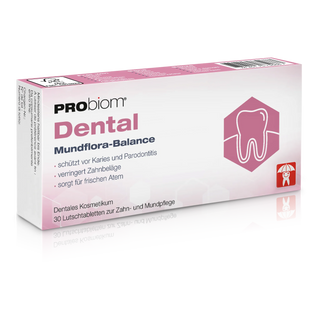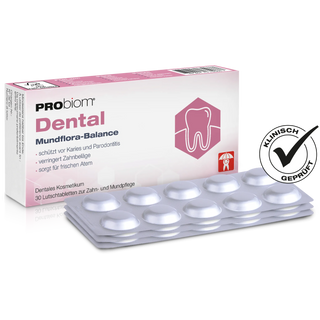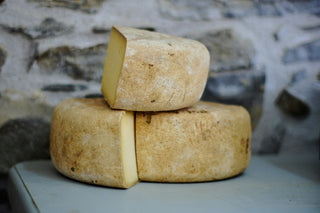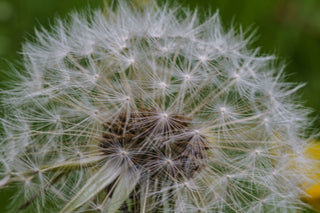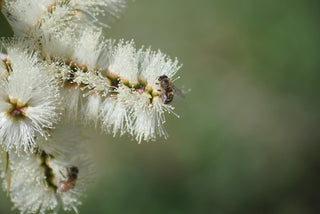Bad breath is a topic that hardly anyone likes to talk about, even though it affects almost everyone at some point. Often, the first thing that comes to mind when bad breath occurs is poor dental hygiene or illness. But diet actually has a huge impact on how fresh or unpleasant our breath smells. Some foods cause an immediate odor that lasts for hours, while others have a long-term effect on the oral flora and digestion.
The question, therefore, is: How exactly is diet related to bad breath? Which foods are "breath killers" and which help prevent bad breath? And how can mindful eating help you feel better and appear more confident in everyday life?
Understanding bad breath: Where does it actually come from?
Before we talk about diet, it's important to understand what actually causes bad breath—medically known as halitosis. In most cases, it originates in the mouth itself. Bacteria decompose food debris, releasing volatile sulfur compounds that have a particularly unpleasant smell. A typical example is the smell of rotten eggs, which is caused by hydrogen sulfide.
But it's not just the bacteria in the mouth that are responsible. Digestion also plays a major role. Food is metabolized in the body, and some of its breakdown products enter the bloodstream and are expelled via the air we breathe. Therefore, even thorough brushing can't prevent garlic or onions from remaining noticeable long after eating.
Nutrition as a key factor for fresh breath
Our daily diet plays a key role in determining whether we are prone to bad breath. It's not just about what we eat in the short term, but also about our long-term eating habits. Consuming a lot of sugar creates an environment in the mouth where bacteria thrive. Drinking plenty of water and eating fiber-rich foods, on the other hand, supports the natural cleansing of the oral cavity.
It's also interesting to note that diet influences saliva flow. Saliva is the body's most important natural "mouthwash." It neutralizes acids, rinses away food debris, and contains antibacterial substances. A dry mouth, on the other hand, is a perfect breeding ground for bacteria—and that's exactly what happens after very salty or high-protein meals when the body retains fluids.
Foods that increase bad breath
Some foods are notorious for their effect on breath. Garlic and onions are the classics, because their sulfur compounds not only affect the mouth but also enter the breath through the entire metabolism. But there are many other "problem foods."
Meat and protein-rich foods, for example, promote the formation of putrefactive bacteria. When proteins are broken down in the mouth or intestines, foul-smelling substances such as ammonia or methyl mercaptan are produced. Very fatty foods can also be problematic because they slow down the digestive process, causing odorous substances to linger in the body longer.
Sugary foods, in turn, promote the growth of bacteria that produce unpleasant odors. Those who regularly consume sweets, sodas, or white flour products not only have a higher risk of tooth decay, but also a greater risk of bad breath.
Another factor is alcohol. It dries out the mouth and disrupts the balance of the oral flora. Even small amounts can impair breath for several hours.
Foods that can prevent bad breath
Fortunately, there are also many foods that freshen breath or at least keep it neutral. Water-rich foods like cucumbers, apples, or celery are particularly helpful. They stimulate saliva production and help cleanse the mouth.
Herbs like parsley, mint, and basil also contain essential oils that mask odors and have antibacterial properties. An apple after a meal can act similarly to a natural toothbrush, loosening food particles and stimulating saliva flow.
Green tea is also interesting. It contains polyphenols that can inhibit bacterial growth. Studies show that regular consumption actually helps improve breath.
High-fiber foods like whole grain products or vegetables are indirectly helpful. They promote healthy digestion and prevent the body from producing too many odor-causing substances.
Dietary patterns and their effect on breathing
Not only individual foods, but entire diets affect breath. The so-called low-carb or ketogenic diet is a good example. Eating very few carbohydrates forces the body to use fat for energy. This creates so-called ketone bodies, which are excreted in the breath and cause a distinctly perceptible, fruity-sour odor. Many describe it as similar to nail polish remover.
Even diets heavy on meat often leave traces on the breath. The high protein breakdown causes putrefaction processes that are difficult to conceal with oral hygiene.
On the other hand, diets rich in fresh vegetables, fruit, and whole grains often have the opposite effect. They promote a balanced intestinal flora, reduce the formation of sulfur compounds, and ensure an overall fresher breath profile.
Bad breath due to digestive problems
The cause of bad breath isn't always in the mouth itself. Sometimes the stomach and intestines are the actual triggers. Reflux, the backflow of stomach acid into the esophagus, can lead to sour breath. Food intolerances such as lactose intolerance or fructose malabsorption can also produce gas and metabolites that smell unpleasant.
This again highlights the importance of diet. Those who regularly eat foods they are intolerant to are likely to also struggle with chronic bad breath. A targeted change in diet or keeping a food diary can help identify triggers.
Hydration and its role
One of the simplest, yet most important, factors in combating bad breath is drinking enough. Water not only flushes away food particles but also ensures adequate saliva production. Even mild dehydration leads to a dry mouth and thus increased odor.
Coffee and alcohol, on the other hand, have the exact opposite effect. They dry out and also leave behind their own aromas, which aren't always pleasant. Therefore, those who drink a lot of coffee should consciously drink water in between to mitigate the effects.
Nutrition and the microbiota in the mouth
A relatively new area of research focuses on oral flora—the billions of bacteria that colonize our mouths. Just as in the gut, the balance of these microorganisms plays a crucial role in our health. An unbalanced diet high in sugar and fat can disrupt this balance and promote the growth of odor-causing germs.
Conversely, a varied diet, plenty of fresh vegetables, and probiotic foods like yogurt or sauerkraut support a healthy oral flora. Probiotic supplements are also being investigated as a possible aid against bad breath, as they can positively influence the bacterial balance throughout the digestive tract.
Practical nutritional tips for fresh breath
The good news: Bad breath can be significantly reduced with a few simple dietary habits. These include regularly eating fresh fruits and vegetables, drinking plenty of water, and limiting the consumption of strong-smelling or very sugary foods.
Regular meals can also help. People who go without eating for a long time produce less saliva, which in turn leads to bad breath. A healthy snack like an apple or a carrot between meals can therefore work wonders.
In the long run, however, balance is crucial. A balanced diet that provides the body with all the essential nutrients while simultaneously easing digestion has a positive effect on your breath – without the need for artificial breath fresheners.
Summary in a table
| Influencing factor | Effect on breathing | Recommendation for fresh breath |
|---|---|---|
| Garlic, onions | Sulphur compounds enter the air we breathe | Enjoy in moderation, combine with parsley |
| Foods high in sugar | promote bacterial growth in the mouth | Reduce sugar, eat fruit instead |
| Protein-rich, meat-heavy diet | Rotting processes, formation of ammonia | Combine protein with vegetables, maintain balance |
| Low-carb/ketogenic diet | Ketone bodies in the breath, fruity-sour smell | Drink enough, soothe breath with herbs |
| Water-rich foods | stimulate saliva flow, clean the mouth | Eat cucumbers, apples, celery regularly |
| Alcohol and coffee | dry out mouth, increase odor | compensate with water |
| Probiotics and fiber | promote healthy oral and intestinal flora | Include yogurt, sauerkraut, whole grains |
Conclusion
Diet and bad breath are more closely linked than many people think. What we eat not only affects our breath in the short term, but also influences the composition of our oral flora, our saliva flow, and even our metabolism in the long term. Some foods are notorious odor producers, while others help keep breath fresh.
The most important recipe for good breath is a balanced diet, plenty of fluids, and a healthy digestive system. Understanding the impact of nutrition can help you combat bad breath – and thus not only make you more confident in your everyday life, but also benefit your overall health.


